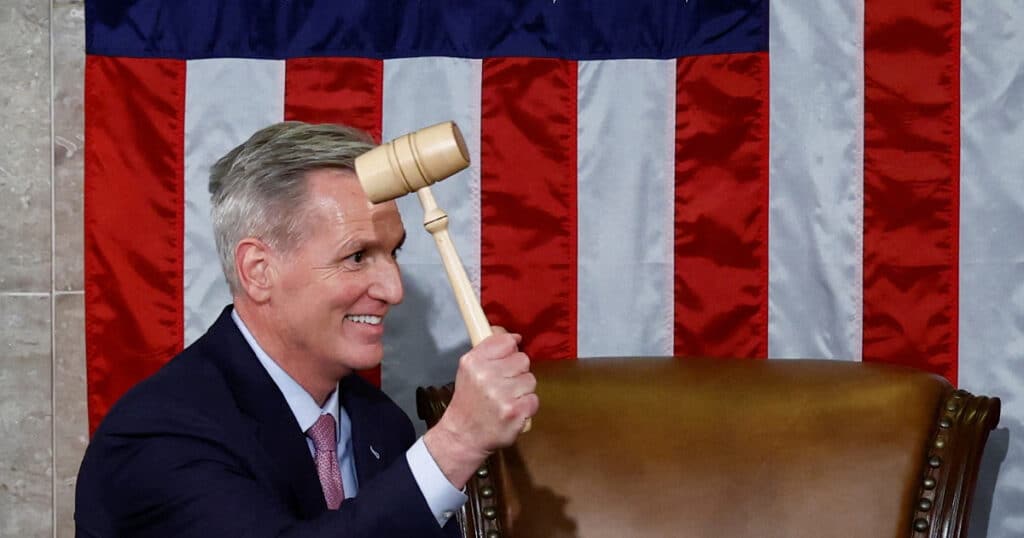
GOP Right Flank Tests McCarthy’s Ability To Negotiate on Debt
Kevin McCarthy walked out of the West Wing with a kind of optimism that perhaps only a politician enjoying a second lease on public life can understand.
The new House speaker had just met with a president who insists there will be no negotiations over raising the debt ceiling. McCarthy leads a narrow Republican House majority hell-bent on forcing exactly that. Somehow, after more than an hour of talks in the Oval Office, McCarthy reported that he had a vision of “where we can find common ground.”
Welcome to the frosty fight over fiscal policy that coincides with the still simmering struggle for the soul of the Republican party. It could take a while. Conservatives are watching closely.
If the possibility of compromise exists, it will likely take months to play out. Congress and the White House have roughly until this summer to come to an agreement on raising the debt ceiling, the statutory limit on how much the government can borrow, or risk a potentially catastrophic default on the national debt. Wednesday’s face-to-face was just the opening gambit.
McCarthy almost didn’t make that meeting. There was never any guarantee Republicans would send him to sit across from Biden. It took 15 ballots after all, and as many concessions, for McCarthy to put down a mutiny within his own party and win the speakership. Three weeks later, though, the newly-minted speaker expressed confidence, telling reporters that on this issue “Republicans are united.”
The fact that voters just divided control of Congress between a GOP House and Democrat Senate, McCarthy said was “a positive.” The debate that will follow, he said during a short press conference outside the White House, “is exactly how government in America is designed – you have to find compromise.” The Biden administration, meanwhile, has been wondering aloud whether McCarthy can survive his own party. The president called him a “decent man” the night before the meeting, before seeming to lament that “he made commitments that are just absolutely off the wall” to become speaker.
“We understand what the speaker is going through,” Karine Jean-Pierre added Wednesday. “He has a caucus that has put forward some pretty extreme ideas, some extreme options in front of the American people.” The White House press secretary was referring to McCarthy’s right flank, many of whom would gather across town later that evening for a celebration in their honor.
The conservative group Freedom Works toasted the 20 House Republicans who “fought to restore regular order in the House” by almost scuttling McCarthy’s speakership. According to audio obtained by RealClearPolitics, those members feel empowered. After the battle for speaker, however, they also sounded invested in his success.
“What we did was we created the tools to save the republic,” Pennsylvania Rep. Scott Perry said of changes to House rules that they demanded of McCarthy in exchange for their support. “Now we’ve got to pick them up and use them.” To win the holdouts over, McCarthy offered members of the House Freedom Caucus seats on the powerful House Rules and Appropriations Committees. He also restored the motion to vacate, a rule that allows a single member to force a vote on ousting a sitting speaker.
None of the members present Wednesday seemed to have an appetite for the pandemonium that would come if they used that provision. Instead, they expressed satisfaction that McCarthy had given them access to the levers of power necessary to influence legislation. They also seemed aware of who would be blamed if the House, post rules changes, descended into chaos.
“Now the work begins, and it begins with all of you. We have to go win this now,” Rep. Chip Roy told a crowd of staffers, donors, and supporters. “Otherwise, we own the mess that we don’t win.” Looking to the future, the Texas Republican continued, “we have got to go win, and we gotta go make sure we stop spending money that we don’t have, and that begins right now with this debt ceiling fight.”
On the House floor last month, Roy explained that his reason for holding out against McCarthy wasn’t personal. The rebellion was instead, he said, a means to an end: restoring the tools necessary to slash bloated government that conservatives see as a threat to Americans’ freedom. For different reasons, fiscal conservatives and the Biden White House are more than happy to point out how previous Republican administrations never fulfilled their promises to tackle the debt.
“I’m not in a place where I’m going to point fingers,” McCarthy told RCP when asked about past GOP failures to reduce debt. After noting that discretionary spending increased more when Democrats held the majority for the last four years, he added that as speaker, “my role right now is to make sure we have a sensible, responsible ability to raise the debt ceiling, but not continue this runaway spending.”
On that general sentiment, the new speaker and the recent rebels are sympatico. North Carolina Rep. Dan Bishop praised the new “dynamic that exists right now.”
At the Freedom Works event, Bishop said that as a result of the rules changes that the GOP leadership agreed to, “the conference is looking to [Reps] Chip Roy and Scott Perry as the thought leaders to begin discussions for what Kevin McCarthy, as speaker, ought to find and determine to be the orthodoxies and then popularizing them in the rest of the Congress.”
Any temporary discomfort, according to Rep. Lauren Boebert of Colorado, was worth it during the speaker struggle because it illustrated the differences between the parties. “People were saying that the Democrats were all unified, look at it, they’re all together,” she recalled. “Well, they’re not allowed to have independent thought. They’re not allowed to step out and do something different. And we did.”
The administration has noticed that growing influence and zeroed in on McCarthy’s right flank. The White House said in a statement earlier this month that by refusing to raise the debt ceiling the Freedom Caucus were engaged in “unprecedented economic vandalism.” Later, after Perry and Boebert were named to the Oversight Committee, the White House slammed GOP leadership for “handing the keys of oversight to the most extreme MAGA members.”
Efforts to drive a wedge inside the Republican conference haven’t yet succeeded, and the GOP may enjoy more solidarity on debt ceiling negotiations than Democrats. While the president said such negotiations are a non-starter, a coalition of moderate House Democrats wrote Monday that they were ready to engage in “good faith negotiations.” Sen. Joe Manchin of West Virginia, meanwhile, said Sunday that it was “a mistake” to prematurely rule out making any kind of compromise.
McCarthy did not offer new details when he left the West Wing, other than to reiterate again to reporters that cuts to entitlements like Social Security and Medicare are non-starters despite what some in his party have previously called for.
The speaker did, however, return to an argument from the Tea Party era, expressing a sentiment that his recent detractors will cheer. He said that “the greatest threat to America is our debt.”
This article was originally published by RealClearPolitics and made available via RealClearWire.



